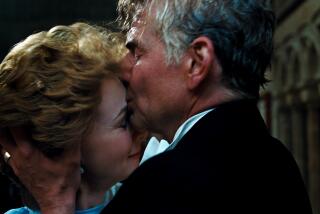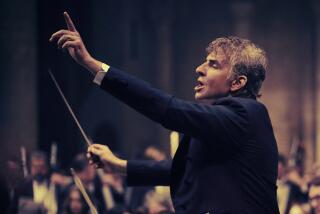Why Benjamin Britten’s music is ever youthful
Benjamin Britten, who never in his life thought of himself as gay, might well be dismayed if he could peer down at how discussion of his life and work has come to be dominated by the matter of his sexuality. The latest biography — by Paul Kildea, a serious scholar and by no means sensationalist — made news by suggesting that Britten’s heart condition, which brought about his death at age 63, was the result of syphilis.
Meanwhile, the tide of performances and critical studies goes on confirming how deeply his music was affected by his irresoluble personal quandary: the wish to be forever a boy among boys.
But perhaps it is time now, in his centenary year, to discover how much more there is to Britten, and in Los Angeles the Britten 100/LA festival will be providing many opportunities to do so throughout the next 12 months, culminating in L.A. Opera’s production of “Billy Budd” early next year.
PHOTOS: Arts and culture in pictures by The Times
Frustrated passion is one theme of that opera, seeming to express Britten’s awareness of his sexuality as a predicament, even a taint, by contrast with the total ease achieved in their work by Aaron Copland or Francis Poulenc, to mention two other gay composers of roughly the same age. Yet Britten’s desire for youth and innocence, to possess them not sexually but in his own being, became, though impossible in life, the source of an abundant creativity.
Here was a composer who produced almost a hundred major works, 11 of them full-length operas, and who ranged in his central concerns all the way from pacifism (“War Requiem”) to the pleasures of childhood, who enjoyed writing not only for international virtuosos (Rostropovich in his cello suites) but also for the choral groups of his hometown, and who could respond in his operas to the social comedy of an English village (“Albert Herring”) or the stark tragedy of a Japanese Noh play (“Curlew River”).
If the irretrievability of innocence remained, throughout this diverse output, one of his themes, it became not only a subject for direct expression — comically in “Albert Herring,” seriously in many other pieces — but also the fuel for a compositional style of great originality and versatility. Britten’s musical preferences are relevant here: Mozart and Schubert rather than Beethoven and most certainly rather than Brahms or Wagner; the lightness of Classicism rather than Romantic extravagance, grace before grandeur.
PHOTOS: LA Opera through the years
This had something to do with a distrust of emotional frankness and of the kind of rhetoric that wants to seize the listener by the ears. Britten recognized that — to use the terms he inherited from Thomas Mann in his last opera, “Death in Venice” — an artist must be in contact with both of the gods: Apollo for clarity and form, Dionysus for urgent energy. Apollo, though, was Britten’s presiding deity, all the way from the piano concerto he wrote in his mid-20s, “Young Apollo,” to the Third String Quartet that was one of his last and finest achievements.
Apollo was youth; Apollo was innocence. And Apollo was the shining consonance of major chords, which Britten used with greater finesse, freshness and variety than any other composer of his generation — or later.
In 1930s London, Britten counted as a daring modernist, but the European composers he emulated were those who maintained some connection with tonality: Stravinsky, Bartók, Alban Berg.
Profiting from their example, he developed a style in which traditional chords could sound as if they were as new as morning, and the skill stayed with him right through his creative life, working with the same brilliant immediacy in late works like “Sacred and Profane,” a garland of choral settings of medieval English poems, as in “A Simple Symphony” for strings (1934) or other products of his extraordinary youth.
A classical, Apollonian artist, though, might have been expected to concentrate on abstract forms, which Britten did not. His “Young Person’s Guide to the Orchestra” (1946), one of the rare masterpieces of music made to educate, was his last big orchestral work apart from a concerto for Rostropovich, and most of his chamber music (the Third Quartet is an exception) came from his 20s and early 30s.
It could be that, once he had discovered himself as an opera composer with “Peter Grimes” (1945), he had little time for other projects: astonishingly, he wrote seven further operatic works during the next decade, including what may be his most intimate such work, “The Rape of Lucretia.” But equally, he seems to have needed words, perhaps not so much to trigger his imagination as to divert it.
He also needed voices. Outstandingly, of course, he needed the idiosyncratic tenor of his partner Peter Pears, for whom he composed a succession of song cycles as well as a major role in each of his operas, but he was also one of the most inventive composers for chorus, whether on the oratorio scale of the “War Requiem,” in unaccompanied sacred pieces of beautiful restraint, or in such robust oddities as “Rejoice in the Lamb.”
One of his foremost choral works is his “Hymn to St. Cecilia,” a setting of words by his friend W.H. Auden that he completed on his way back by ship to England in April 1942 after three years in the United States. Those three years were crucial in many respects: They saw the composition of his “Sinfonia da requiem,” First String Quartet and other major works, and it was in a West Coast bookstore that he found the George Crabbe poem on which he was to base “Peter Grimes.”
What might have happened had he stayed in the United States is fascinating to conjecture. He probably would not have written “Peter Grimes,” which belongs so much to the eastern seaboard of England, where he was born, and where he returned to settle.
His “American Overture” (1941) suggests he could easily have gone native. Perhaps he would have given Richard Rodgers a run for his money or become one of the great Hollywood composers.
This was a man for whom almost anything was possible, except personal happiness.
Born in Wales, Griffiths has been a music critic for the New York Times, the New Yorker and the Times of London. He is also a novelist and librettist.
--------------------------
Britten 100/LA
Where: The Music Center, the Broad Stage, Soka Performing Arts Center, LACMA and dozens of other locations, mostly in Los Angeles County
When: Now through March 2014 April 2013
Information: https://www.laopera.com/Britten100LA
MORE
INTERACTIVE: Christopher Hawthorne’s On the Boulevards
Depictions of violence in theater and more
PHOTOS: Arts and culture in pictures
More to Read
The biggest entertainment stories
Get our big stories about Hollywood, film, television, music, arts, culture and more right in your inbox as soon as they publish.
You may occasionally receive promotional content from the Los Angeles Times.






